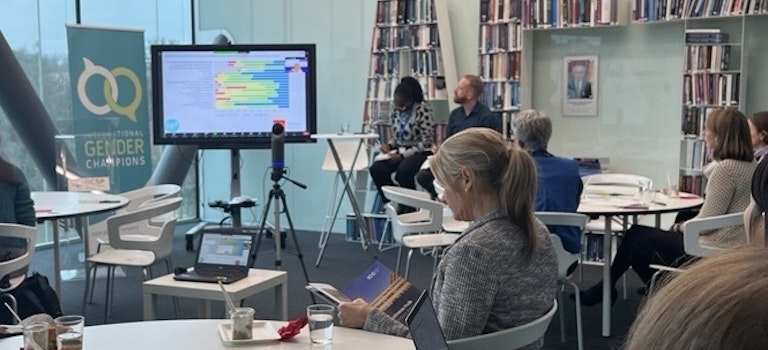Gender mainstreaming is a pivotal strategy aimed at ensuring the integration of gender equality perspectives into legislation, policies or programmes, in all areas and at all levels. It is a strategy for assessing the implications of any planned action for women and men and addressing gender-specific concerns and experiences. While gender mainstreaming is an integral tool to enhance gender equality and avoid reinforcing existing inequalities, there is often limited institutional capacity towards effectively implementing gender mainstreaming approaches. The technical nature of the term further disincentivises engagement with and clear conceptual understanding of the term.
To address these challenges, the IGC Secretariat hosted its 5th and final Lunch and Learn event of the year on 12 December 2023, titled ‘Gender Mainstreaming: Inclusion by Design’. The event aimed at demystifying gender mainstreaming and equipping participants with actionable insights for advancing gender equality within their respective contexts.
The event featured three gender experts: Lucy Ferguson, a Gender and Diversity Specialist and author of Gender Training: A Transformative Tool for Gender Equality; Elisabeth Prügl, Professor of International Relations and Political Science at the Geneva Graduate Institute; and Callum Watson, Gender Coordinator at the Small Arms Survey. Gloria Efua Nkrumah, a master’s student at the Geneva Graduate Institute and Intern at the International Gender Champions Secretariat, moderated the event.


Ferguson presented insights from a research project undertaken with Elisabeth Prügl on the UN System-wide Action Plan on Gender Equality and the Empowerment of Women (UN-SWAP). With its 17 performance indicators, the UN SWAP promotes gender mainstreaming across all institutional areas and functions and assigns common performance standards for the gender-related work of all UN entities. Despite a dominant perception of UN-SWAP as being technocratic rather than transformative, Ferguson and Prügl's research indicates that feminists can effectively leverage the tool for transformative change. Notably, they credited the UN-SWAP with having strengthened the network of gender focal points and facilitated mutual learning.
Callum Watson shared his practical experience in working towards gender mainstreaming in his role as Gender Coordinator. He noted that having “gender” in his title, holding a senior position, and having a dedicated budget assigned to his work were key to the effective implementation of his projects. Watson identified three lessons learned in his field of work. First, he stressed the need for an attitude change in people, explaining that “If you don't have the attitude on the importance of gender equality, you can’t effectively implement the others (your knowledge and skills)”. He also underlined the value of facilitating learning and awareness-raising outside formal training sessions through informal conversations and partnerships and of building personal relationships with colleagues.
Following the expert inputs, the audience engaged in a thought-provoking discussion with the speakers. Given the number of UN-SWAP indicators, participants were keen to understand which to prioritise within their organisations to increase their chances of success. Ferguson identified three key indicators: policy, financial resources allocation, and capacity assessment. Interestingly, Ferguson noted, these were also the weakest indicators according to their research, due to the demand for greater dedication and systemic change.
Participants also raised the issue of institutionalising gender mainstreaming instead of having the burden fall exclusively on the institutional gender focal point. Prügl specifically called for transformative change that extends beyond the roles of focal points and advocated for the creation of feminist networks and peer-to-peer learning opportunities to support systemic transformation.

This event was part of the IGC 'Lunch and Learn' series, which aims to foster interactions between the IGC community, experts, academics, and activists. It is made possible by a grant from the US Mission and serves as a platform for dialogue and knowledge exchange. The events are open to IGC focal points, Champions, and the broader public, including students.
